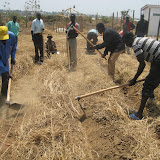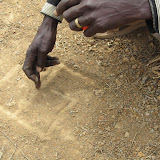Saturday, August 28
Yesterday (Friday) was very unusual. We'd planned to visit two churches, but got a call that there had been two incidents of shooting and everyone (not just foreigners) were advised to stay at home. Actually, we felt well taken care of since three people called us and three others dropped by to check on us and update us about the situation. Apparently one was a domestic dispute in which a Dinka husband-to-be argued with his fiancee's family about marrying his wife sooner than originally agreed even though it would cut short her education; when the family disagreed, he shot and killed 9 of them. And in a separate incident, a Dinka soldier shot and killed his Nuer superior because he had been disciplined for drinking and drug use. We stayed and worked at home, and heard UN helicopter landing at the nearby UNMIS compound; later found out top GOSS (Government of Southern Sudan) officials from Juba had come to handle the situation and that both shooters had been caught. We praise God that things were handled in a way that did not fan the flames of the traditional Nuer-Dinka rivalry, and that it is being resolved by rule of law rather than the rough justice that prevailed during the war and has sometimes still occurred though the war is over.
Elias from UMCOR was supposed to take the Landcruiser to Uganda yesterday to pick up up a backup generator for the Hankins new house, but was delayed until today because of this situation. He left early this morning. Phyllis is not feeling well so we pray for her. Rev. Isaac Sebit comes to talk with Boo, and gives me a lesson on his motorcycle (a brave and generous man.)
Sunday, August 29
Since the Land cruiser is in Entebbe to pickup the backup generator, we are walking or “footing” as they say here. We took the opportunity to go to church with our UK missionary friends, John and Poppy Spens, who help the Martha Clinic and build primary schools. It is an ECS church (Episcopal Church of Sudan) with 3 services, and we're at the English service. Poppy apologizes for the formal liturgy, but we tell her there are United Methodist churches that have a more formal liturgy than this. The sermon is on Psalm 121, about God being our only, and reliable, source of help! Good reminder. Diantha and I go to the missionary prayer fellowship on Sunday evening for the second time; the crowd has doubled since last week and there are 12 there. John Spens leads an excellent Bible study on Mark, the passage when Jesus is asleep in the boat when the storm arises. Take home point: fear is the opposite of faith. A difficult lesson to really incorporate and practice, but Amen.
Mon, August 30
Since the Landcruiser is on its way back from Uganda and still not here to day, there is no way for us to go to yet another 2 churches we had originally scheduled for today. Also, Diantha has discovered she has the chance to take a free week-long train-the-trainer workshop being offered on Water, Sanitation and Hygiene (one of her main focuses for her village work), and the workshop is being held only a 30 minute walk away. So we postpone going to the churches. Tally: we've been blocked from 1 church by road problems, 4 by last Friday's security situation and the way it changed the schedule, and now we'll skip yet another 2 because Boo and Phyllis and Diantha have persuaded me it makes much more sense to go to the villages at a later date when Diantha can go too. I'm eager to get on with our initial visits to churches, but I have to (reluctantly) admit they are right. I must not only be flexible about changes in the schedule, but also must be patient with how much longer things take! So I go do something fun; I go visit the Principal of the Crop Training Center, David Bala my friend from 2 previous trips, and have a great talk with him. He gives me excellent advice on how to handle the snail problem that is devastating the crops in two of the churches we met with. David also offers me free papaya starts to share with the churches, and free chaya cuttings (chaya is “tree spinach”, a perennial with edible leaves that have more nutrition than spinach.) And David also gives me very good advice on which motorcycle brand will be best to buy for riding out to the villages. We agree to try to travel together to meetings of the USAID agriculture group in Juba. When I walk back to the UMCOR compound, Elias pulls up in the Landcruiser with not only the generator, but all the luggage Diantha and I had to leave at the East Africa Annual Conference Office! We were expecting to get it a week later! What a day of blessings!
Tues, Aug. 31
While Boo takes Phyllis to the airport to fly to Uganda to meet the team coming in tonight, I go to weekly security briefing with Flora from UMCOR. The briefing is just down the street a short walk at the UN High Commission on Refugees compound. When we walk in there are four UN uniformed personnel from various countries, five other NGO/mission foreigners like me (two Americans, two UK, one Norwegian) and about eight Sudanese representing various NGOs. We learn details about the Friday security incidents, and also that the phone tree to inform NGOs was only partly effective; plans are made to improve it. Later while Diantha is still at her training Boo and I make 3 visits to the drivers license office, finally find it open, and in one short hour have licenses for Diantha and I! Then we go and with much silent prayer I buy a motorcycle, the same brand David Bala recommended, and ride it home still praying. I only stall twice; its controls are different than the one Sebit taught me on, but I finally figure it out with no major mishap. The first time I stalled, in the market area, a young man ran over and helped me get it started (answer to prayer?); I appreciate his help, especially since half a dozen of his friends are watching and laughing! When I get back home I practice riding in the UMCOR compound for about 2 hours. Prayer is great, but practice helps too.
Weds, Sept 1
Today we drop Diantha at her training early in the morning at the ECS Guest House, and double check the reservations there for the team coming in this weekend. On to the bank where I get the paperwork to open our checking account, and to the market where we finally find motorcycle helmets the right style and size for Diantha and I. Back at the house, Pastor Isaac Sebit comes and helps us divide up the 400 lb of sorghum and peanut seeds that have been given to the United Methodists from the CRWRS (Christian Reform World Relief Service.) Using our luggage scale, Sebit and Boo and I fill 17sacks of equal weight of peanut seed, and another 17 sacks of sorghum seed, one of each kind of seed for each church. CRWRS has also given us good hoe blades, two for each of our churches. We'll give the seed and hoe blades to the pastors next at the pastor's meeting. It's hard hot work today, but it feels GREAT to do something concrete and immediate for agriculture in the UM churches. Most of what we will be doing this fall is a long-range planning session at each church and a first project coming out of that, but we need to mix the long-range with some short-range. It is still planting season, so these seeds and tools will come at a good time. We get done just in time to grab a cold coke, Skype with Danny Howe, and then I jump on the new motorcycle to go pick up Diantha from her workshop while the sky thunders and threatens the usual evening downpour. Its the first time I've ridden the motorcycle a mile with someone on the back, but all goes well and we beat the rain. Thank God for a productive, good day.
Thurs, Sept. 2
The exciting and inspiring days of work in the villages, the part of my service here that I enjoy so much, is inevitably founded on days like today of tedious detail and errands: setting up our bank account, setting up our budget and financial record-keeping on the computer, buying a chain and padlock for our motorcycle, shopping for groceries. One exciting thing is arranging to get parts for a grinding mill (hand- or bike-cranked) sent to Kampala so it can be manufactured and we can buy one and try it out to see if its feasible for the villages; this was one of the high priorities of 3 of the 6 churches we visited last week.
Fri., Sept. 3
I have a completely free day until 3 pm, so I set out walking ½ mile to the compound for the Christian Reformed World Relief Commission. High of the day: great talk with Nate at CRWRC not only about their group's excellent work in village agricultural development, but the real scoop on the other NGO (Non-Governmental Organizations) and government agencies involved in agriculture. My list of the NGOs I've identified is now longer than the list of plants and animals I can identify. I called two other key agriculture contacts and set up meetings with them. Low of the day: the brand new HP printer I bought in Kampala will not install on my computer or make copies.
Sat., Sept 4
Today the team from our home Holston Conference arrived: Rev. Linda Bird Wright, Delphine Swanson, Jane Robinson, Joy Robinson Schultz, Libby Dearing and Fred Dearing. They are here to head up the purchase of furnishings for the new Hankins house/guesthouse for visitors and mission teas (mainly the first four people listed) and Libby and Fred are also here to work on the future orphanage project and the present school situation. We'll go to Ligotolo UMC tomorrow morning for worship, and from then on Diantha and I will pretty much devote the next week and a half to helping with the team. We'll probably be able to get the rest of our own household shopping done as we spend time in the market helping them shop for the Hankins house. And we may be able to squeeze in a few meetings with other mission groups and NGOs as we try to get a full picture of work already going on like ours.
Today Diantha completed her WaSH (Water and Sanitation and Hygiene) training. The purpose was to train 16 people from three area villages to be Sanitation and Hygiene promoters. This is organized through a Christian NGO, Across which is doing many things we hope to do so we will visit them too to learn more. We'd tried to take the WaSH training in the U.S. twice, and were stymied both times; but it turned out for the better since by doing it here Diantha learned a lot about language, and learning styles and approaches, and also about local culture and situations: many people must get drinking water from contaminated rivers and boil water if possible; many people do not have latrines; some have pits with a simple or no structure . She'll get to put these things into practice when she does a local training on September 18 to which women from all the Sudanese United Methodist churches have been invited.
Sunday, September 5, 2010
Subscribe to:
Post Comments (Atom)
















No comments:
Post a Comment